Economic Analysis: UK Housing Market Trends and Changes (2009-2019)
VerifiedAdded on 2023/06/13
|15
|3932
|250
Report
AI Summary
This report provides a detailed analysis of the UK housing market between 2009 and 2019, focusing on the changes in average house prices and the key economic determinants influencing these changes. It explores factors such as economic growth, unemployment rates, interest rates, customer trust, mortgage availability, taxes, and subsidies. The report also examines the impact of government policies and actions during this period, including adjustments to interest rates. Furthermore, it assesses the initial impact of the COVID-19 pandemic on the UK housing market. The analysis uses data and economic principles to explain the fluctuations in house prices and the overall dynamics of the UK housing sector. Desklib offers this report as a valuable resource for students studying economics and real estate.
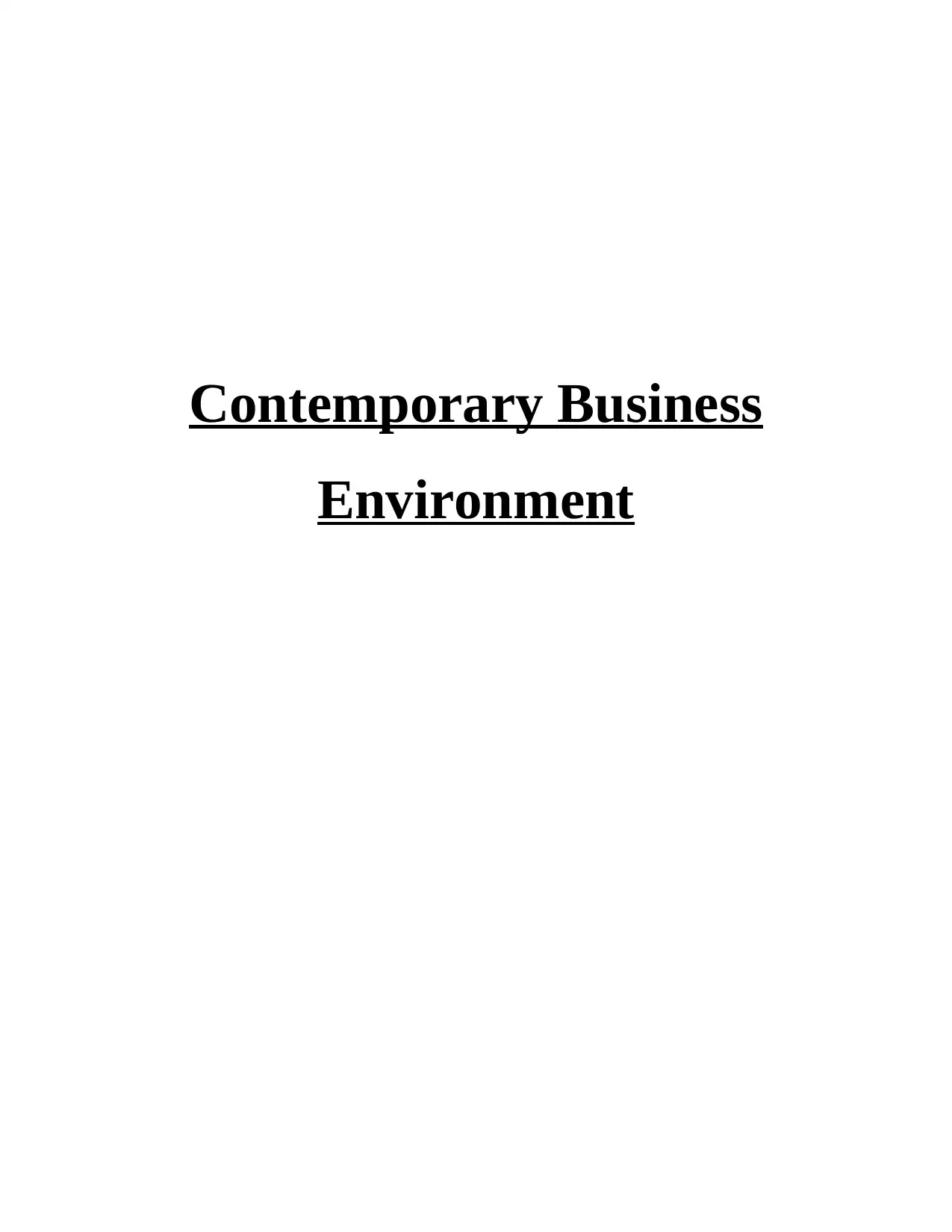
Contemporary Business
Environment
Environment
Paraphrase This Document
Need a fresh take? Get an instant paraphrase of this document with our AI Paraphraser
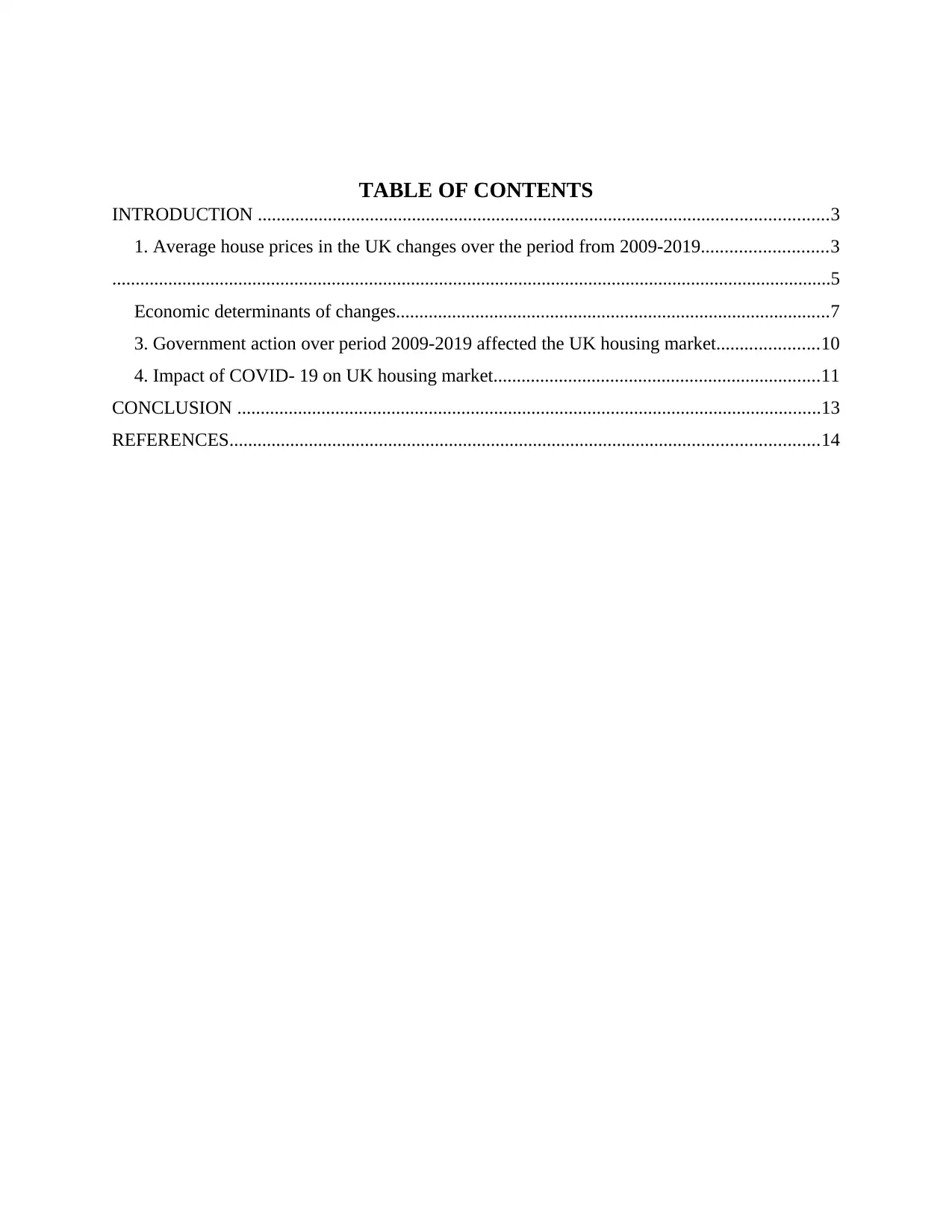
TABLE OF CONTENTS
INTRODUCTION ..........................................................................................................................3
1. Average house prices in the UK changes over the period from 2009-2019...........................3
..........................................................................................................................................................5
Economic determinants of changes.............................................................................................7
3. Government action over period 2009-2019 affected the UK housing market......................10
4. Impact of COVID- 19 on UK housing market......................................................................11
CONCLUSION .............................................................................................................................13
REFERENCES..............................................................................................................................14
INTRODUCTION ..........................................................................................................................3
1. Average house prices in the UK changes over the period from 2009-2019...........................3
..........................................................................................................................................................5
Economic determinants of changes.............................................................................................7
3. Government action over period 2009-2019 affected the UK housing market......................10
4. Impact of COVID- 19 on UK housing market......................................................................11
CONCLUSION .............................................................................................................................13
REFERENCES..............................................................................................................................14
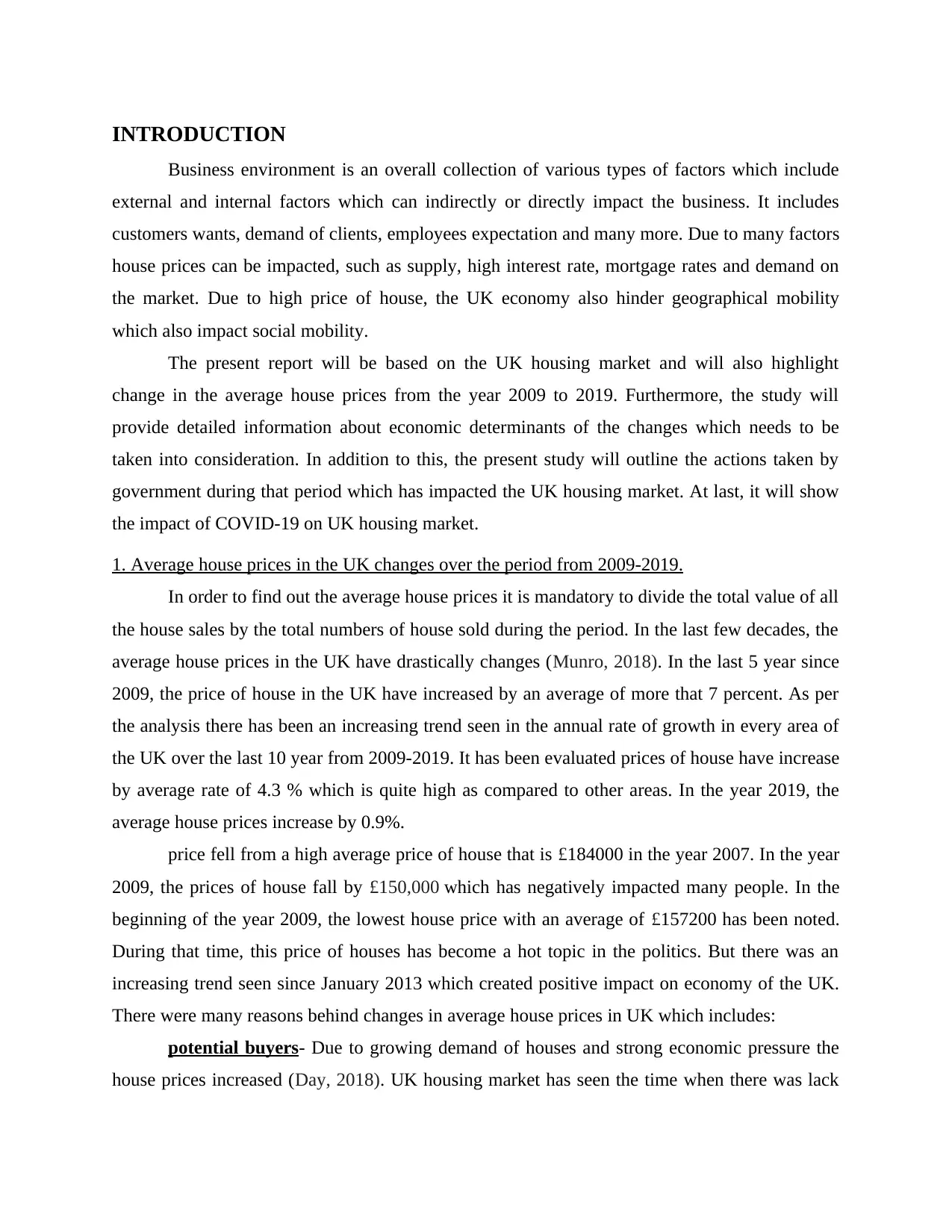
INTRODUCTION
Business environment is an overall collection of various types of factors which include
external and internal factors which can indirectly or directly impact the business. It includes
customers wants, demand of clients, employees expectation and many more. Due to many factors
house prices can be impacted, such as supply, high interest rate, mortgage rates and demand on
the market. Due to high price of house, the UK economy also hinder geographical mobility
which also impact social mobility.
The present report will be based on the UK housing market and will also highlight
change in the average house prices from the year 2009 to 2019. Furthermore, the study will
provide detailed information about economic determinants of the changes which needs to be
taken into consideration. In addition to this, the present study will outline the actions taken by
government during that period which has impacted the UK housing market. At last, it will show
the impact of COVID-19 on UK housing market.
1. Average house prices in the UK changes over the period from 2009-2019.
In order to find out the average house prices it is mandatory to divide the total value of all
the house sales by the total numbers of house sold during the period. In the last few decades, the
average house prices in the UK have drastically changes (Munro, 2018). In the last 5 year since
2009, the price of house in the UK have increased by an average of more that 7 percent. As per
the analysis there has been an increasing trend seen in the annual rate of growth in every area of
the UK over the last 10 year from 2009-2019. It has been evaluated prices of house have increase
by average rate of 4.3 % which is quite high as compared to other areas. In the year 2019, the
average house prices increase by 0.9%.
price fell from a high average price of house that is £184000 in the year 2007. In the year
2009, the prices of house fall by £150,000 which has negatively impacted many people. In the
beginning of the year 2009, the lowest house price with an average of £157200 has been noted.
During that time, this price of houses has become a hot topic in the politics. But there was an
increasing trend seen since January 2013 which created positive impact on economy of the UK.
There were many reasons behind changes in average house prices in UK which includes:
potential buyers- Due to growing demand of houses and strong economic pressure the
house prices increased (Day, 2018). UK housing market has seen the time when there was lack
Business environment is an overall collection of various types of factors which include
external and internal factors which can indirectly or directly impact the business. It includes
customers wants, demand of clients, employees expectation and many more. Due to many factors
house prices can be impacted, such as supply, high interest rate, mortgage rates and demand on
the market. Due to high price of house, the UK economy also hinder geographical mobility
which also impact social mobility.
The present report will be based on the UK housing market and will also highlight
change in the average house prices from the year 2009 to 2019. Furthermore, the study will
provide detailed information about economic determinants of the changes which needs to be
taken into consideration. In addition to this, the present study will outline the actions taken by
government during that period which has impacted the UK housing market. At last, it will show
the impact of COVID-19 on UK housing market.
1. Average house prices in the UK changes over the period from 2009-2019.
In order to find out the average house prices it is mandatory to divide the total value of all
the house sales by the total numbers of house sold during the period. In the last few decades, the
average house prices in the UK have drastically changes (Munro, 2018). In the last 5 year since
2009, the price of house in the UK have increased by an average of more that 7 percent. As per
the analysis there has been an increasing trend seen in the annual rate of growth in every area of
the UK over the last 10 year from 2009-2019. It has been evaluated prices of house have increase
by average rate of 4.3 % which is quite high as compared to other areas. In the year 2019, the
average house prices increase by 0.9%.
price fell from a high average price of house that is £184000 in the year 2007. In the year
2009, the prices of house fall by £150,000 which has negatively impacted many people. In the
beginning of the year 2009, the lowest house price with an average of £157200 has been noted.
During that time, this price of houses has become a hot topic in the politics. But there was an
increasing trend seen since January 2013 which created positive impact on economy of the UK.
There were many reasons behind changes in average house prices in UK which includes:
potential buyers- Due to growing demand of houses and strong economic pressure the
house prices increased (Day, 2018). UK housing market has seen the time when there was lack
⊘ This is a preview!⊘
Do you want full access?
Subscribe today to unlock all pages.

Trusted by 1+ million students worldwide
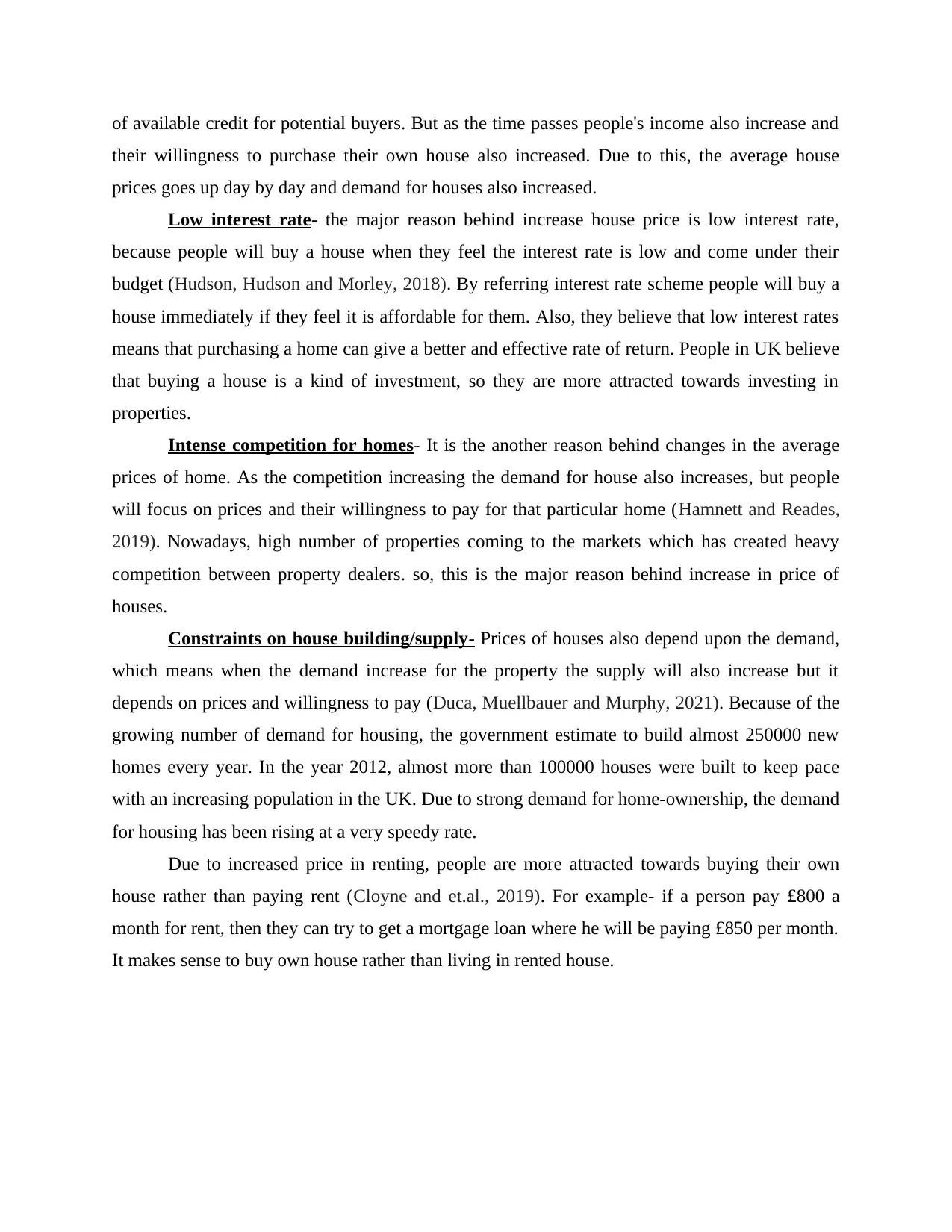
of available credit for potential buyers. But as the time passes people's income also increase and
their willingness to purchase their own house also increased. Due to this, the average house
prices goes up day by day and demand for houses also increased.
Low interest rate- the major reason behind increase house price is low interest rate,
because people will buy a house when they feel the interest rate is low and come under their
budget (Hudson, Hudson and Morley, 2018). By referring interest rate scheme people will buy a
house immediately if they feel it is affordable for them. Also, they believe that low interest rates
means that purchasing a home can give a better and effective rate of return. People in UK believe
that buying a house is a kind of investment, so they are more attracted towards investing in
properties.
Intense competition for homes- It is the another reason behind changes in the average
prices of home. As the competition increasing the demand for house also increases, but people
will focus on prices and their willingness to pay for that particular home (Hamnett and Reades,
2019). Nowadays, high number of properties coming to the markets which has created heavy
competition between property dealers. so, this is the major reason behind increase in price of
houses.
Constraints on house building/supply- Prices of houses also depend upon the demand,
which means when the demand increase for the property the supply will also increase but it
depends on prices and willingness to pay (Duca, Muellbauer and Murphy, 2021). Because of the
growing number of demand for housing, the government estimate to build almost 250000 new
homes every year. In the year 2012, almost more than 100000 houses were built to keep pace
with an increasing population in the UK. Due to strong demand for home-ownership, the demand
for housing has been rising at a very speedy rate.
Due to increased price in renting, people are more attracted towards buying their own
house rather than paying rent (Cloyne and et.al., 2019). For example- if a person pay £800 a
month for rent, then they can try to get a mortgage loan where he will be paying £850 per month.
It makes sense to buy own house rather than living in rented house.
their willingness to purchase their own house also increased. Due to this, the average house
prices goes up day by day and demand for houses also increased.
Low interest rate- the major reason behind increase house price is low interest rate,
because people will buy a house when they feel the interest rate is low and come under their
budget (Hudson, Hudson and Morley, 2018). By referring interest rate scheme people will buy a
house immediately if they feel it is affordable for them. Also, they believe that low interest rates
means that purchasing a home can give a better and effective rate of return. People in UK believe
that buying a house is a kind of investment, so they are more attracted towards investing in
properties.
Intense competition for homes- It is the another reason behind changes in the average
prices of home. As the competition increasing the demand for house also increases, but people
will focus on prices and their willingness to pay for that particular home (Hamnett and Reades,
2019). Nowadays, high number of properties coming to the markets which has created heavy
competition between property dealers. so, this is the major reason behind increase in price of
houses.
Constraints on house building/supply- Prices of houses also depend upon the demand,
which means when the demand increase for the property the supply will also increase but it
depends on prices and willingness to pay (Duca, Muellbauer and Murphy, 2021). Because of the
growing number of demand for housing, the government estimate to build almost 250000 new
homes every year. In the year 2012, almost more than 100000 houses were built to keep pace
with an increasing population in the UK. Due to strong demand for home-ownership, the demand
for housing has been rising at a very speedy rate.
Due to increased price in renting, people are more attracted towards buying their own
house rather than paying rent (Cloyne and et.al., 2019). For example- if a person pay £800 a
month for rent, then they can try to get a mortgage loan where he will be paying £850 per month.
It makes sense to buy own house rather than living in rented house.
Paraphrase This Document
Need a fresh take? Get an instant paraphrase of this document with our AI Paraphraser
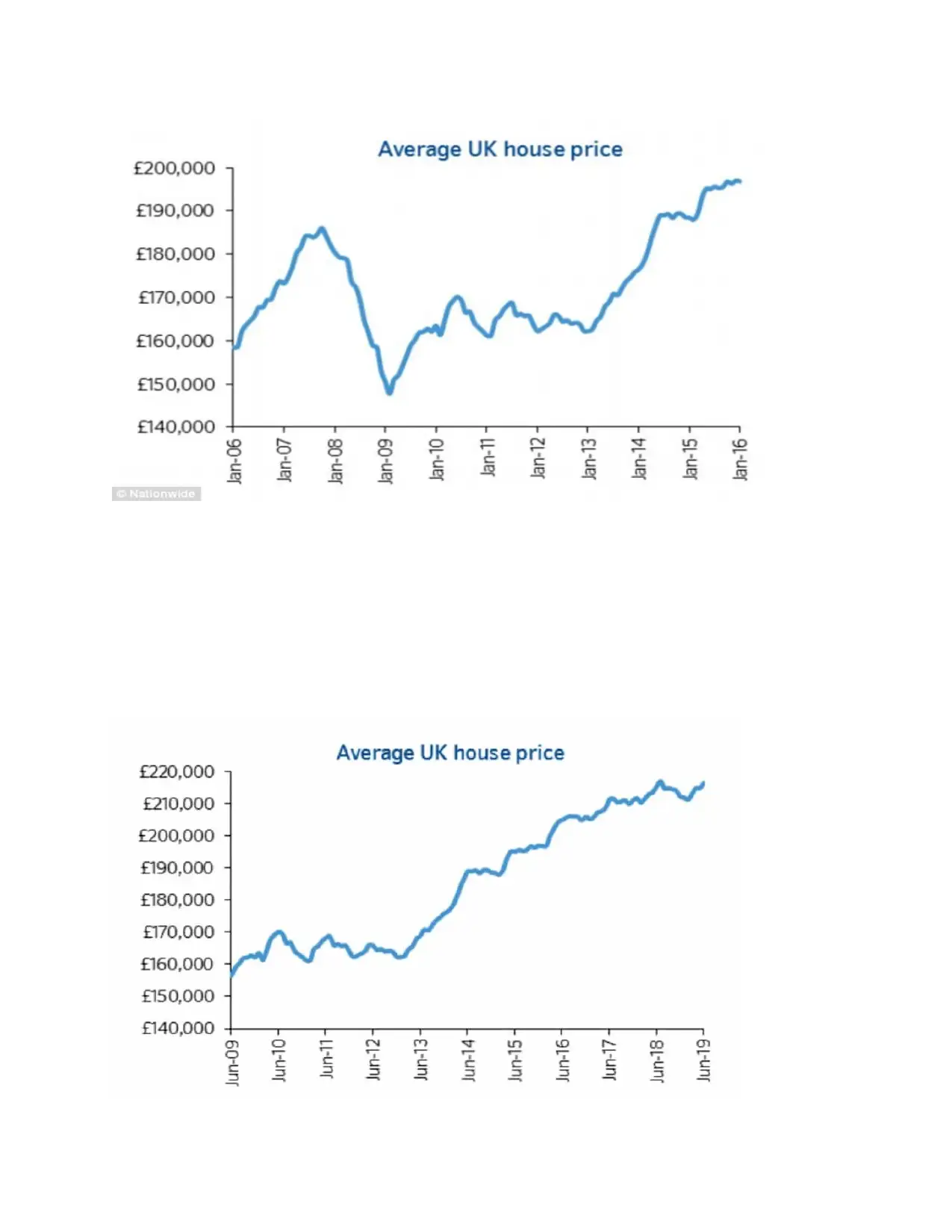

Source: (UK house price index June 2019)
From the above mentioned graph, it has been evaluated that the average prices of house has
increased every year from 2009-2019. In the year 2019, the price gone up which is almost
£220000.
From the above mentioned graph, it has been evaluated that the average prices of house has
increased every year from 2009-2019. In the year 2019, the price gone up which is almost
£220000.
⊘ This is a preview!⊘
Do you want full access?
Subscribe today to unlock all pages.

Trusted by 1+ million students worldwide
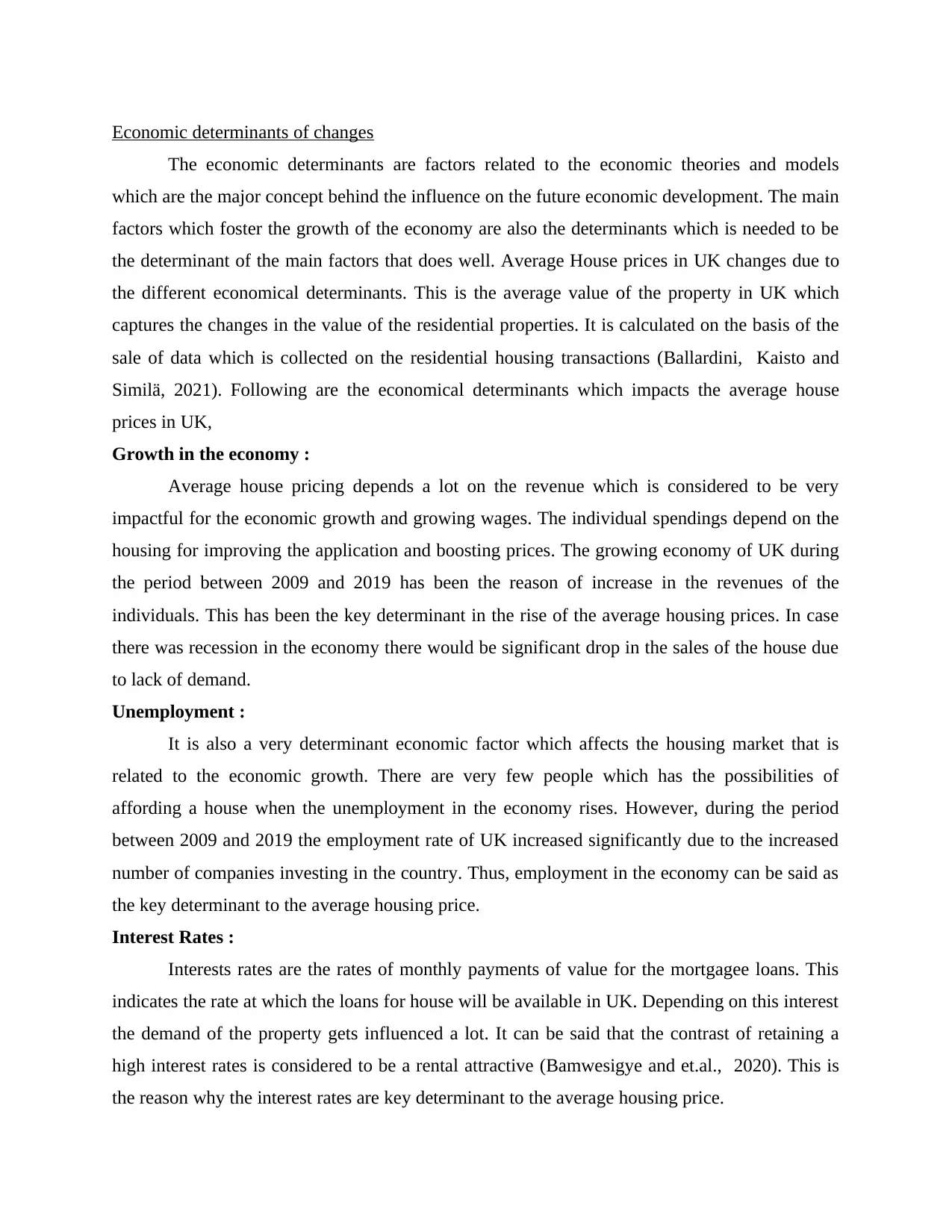
Economic determinants of changes
The economic determinants are factors related to the economic theories and models
which are the major concept behind the influence on the future economic development. The main
factors which foster the growth of the economy are also the determinants which is needed to be
the determinant of the main factors that does well. Average House prices in UK changes due to
the different economical determinants. This is the average value of the property in UK which
captures the changes in the value of the residential properties. It is calculated on the basis of the
sale of data which is collected on the residential housing transactions (Ballardini, Kaisto and
Similä, 2021). Following are the economical determinants which impacts the average house
prices in UK,
Growth in the economy :
Average house pricing depends a lot on the revenue which is considered to be very
impactful for the economic growth and growing wages. The individual spendings depend on the
housing for improving the application and boosting prices. The growing economy of UK during
the period between 2009 and 2019 has been the reason of increase in the revenues of the
individuals. This has been the key determinant in the rise of the average housing prices. In case
there was recession in the economy there would be significant drop in the sales of the house due
to lack of demand.
Unemployment :
It is also a very determinant economic factor which affects the housing market that is
related to the economic growth. There are very few people which has the possibilities of
affording a house when the unemployment in the economy rises. However, during the period
between 2009 and 2019 the employment rate of UK increased significantly due to the increased
number of companies investing in the country. Thus, employment in the economy can be said as
the key determinant to the average housing price.
Interest Rates :
Interests rates are the rates of monthly payments of value for the mortgagee loans. This
indicates the rate at which the loans for house will be available in UK. Depending on this interest
the demand of the property gets influenced a lot. It can be said that the contrast of retaining a
high interest rates is considered to be a rental attractive (Bamwesigye and et.al., 2020). This is
the reason why the interest rates are key determinant to the average housing price.
The economic determinants are factors related to the economic theories and models
which are the major concept behind the influence on the future economic development. The main
factors which foster the growth of the economy are also the determinants which is needed to be
the determinant of the main factors that does well. Average House prices in UK changes due to
the different economical determinants. This is the average value of the property in UK which
captures the changes in the value of the residential properties. It is calculated on the basis of the
sale of data which is collected on the residential housing transactions (Ballardini, Kaisto and
Similä, 2021). Following are the economical determinants which impacts the average house
prices in UK,
Growth in the economy :
Average house pricing depends a lot on the revenue which is considered to be very
impactful for the economic growth and growing wages. The individual spendings depend on the
housing for improving the application and boosting prices. The growing economy of UK during
the period between 2009 and 2019 has been the reason of increase in the revenues of the
individuals. This has been the key determinant in the rise of the average housing prices. In case
there was recession in the economy there would be significant drop in the sales of the house due
to lack of demand.
Unemployment :
It is also a very determinant economic factor which affects the housing market that is
related to the economic growth. There are very few people which has the possibilities of
affording a house when the unemployment in the economy rises. However, during the period
between 2009 and 2019 the employment rate of UK increased significantly due to the increased
number of companies investing in the country. Thus, employment in the economy can be said as
the key determinant to the average housing price.
Interest Rates :
Interests rates are the rates of monthly payments of value for the mortgagee loans. This
indicates the rate at which the loans for house will be available in UK. Depending on this interest
the demand of the property gets influenced a lot. It can be said that the contrast of retaining a
high interest rates is considered to be a rental attractive (Bamwesigye and et.al., 2020). This is
the reason why the interest rates are key determinant to the average housing price.
Paraphrase This Document
Need a fresh take? Get an instant paraphrase of this document with our AI Paraphraser
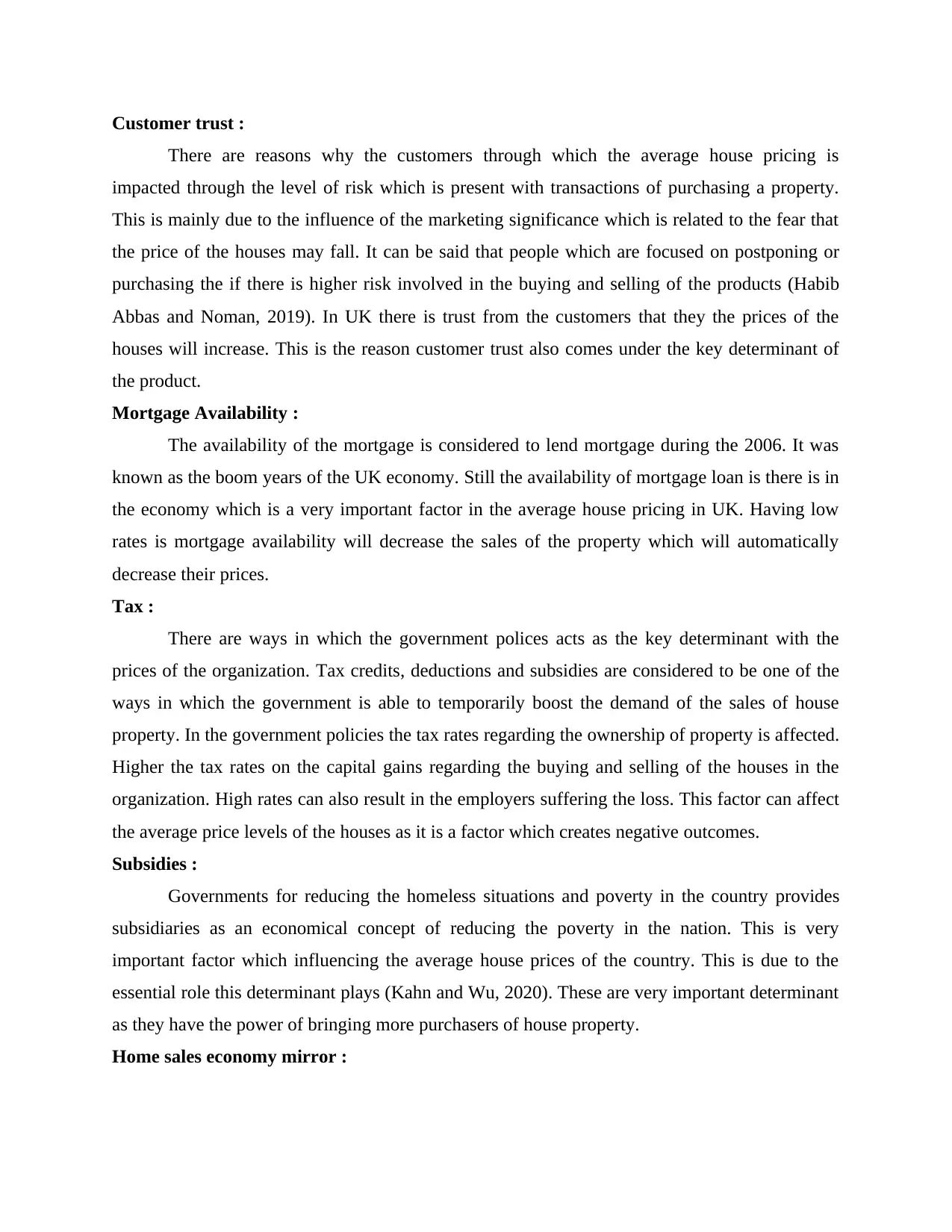
Customer trust :
There are reasons why the customers through which the average house pricing is
impacted through the level of risk which is present with transactions of purchasing a property.
This is mainly due to the influence of the marketing significance which is related to the fear that
the price of the houses may fall. It can be said that people which are focused on postponing or
purchasing the if there is higher risk involved in the buying and selling of the products (Habib
Abbas and Noman, 2019). In UK there is trust from the customers that they the prices of the
houses will increase. This is the reason customer trust also comes under the key determinant of
the product.
Mortgage Availability :
The availability of the mortgage is considered to lend mortgage during the 2006. It was
known as the boom years of the UK economy. Still the availability of mortgage loan is there is in
the economy which is a very important factor in the average house pricing in UK. Having low
rates is mortgage availability will decrease the sales of the property which will automatically
decrease their prices.
Tax :
There are ways in which the government polices acts as the key determinant with the
prices of the organization. Tax credits, deductions and subsidies are considered to be one of the
ways in which the government is able to temporarily boost the demand of the sales of house
property. In the government policies the tax rates regarding the ownership of property is affected.
Higher the tax rates on the capital gains regarding the buying and selling of the houses in the
organization. High rates can also result in the employers suffering the loss. This factor can affect
the average price levels of the houses as it is a factor which creates negative outcomes.
Subsidies :
Governments for reducing the homeless situations and poverty in the country provides
subsidiaries as an economical concept of reducing the poverty in the nation. This is very
important factor which influencing the average house prices of the country. This is due to the
essential role this determinant plays (Kahn and Wu, 2020). These are very important determinant
as they have the power of bringing more purchasers of house property.
Home sales economy mirror :
There are reasons why the customers through which the average house pricing is
impacted through the level of risk which is present with transactions of purchasing a property.
This is mainly due to the influence of the marketing significance which is related to the fear that
the price of the houses may fall. It can be said that people which are focused on postponing or
purchasing the if there is higher risk involved in the buying and selling of the products (Habib
Abbas and Noman, 2019). In UK there is trust from the customers that they the prices of the
houses will increase. This is the reason customer trust also comes under the key determinant of
the product.
Mortgage Availability :
The availability of the mortgage is considered to lend mortgage during the 2006. It was
known as the boom years of the UK economy. Still the availability of mortgage loan is there is in
the economy which is a very important factor in the average house pricing in UK. Having low
rates is mortgage availability will decrease the sales of the property which will automatically
decrease their prices.
Tax :
There are ways in which the government polices acts as the key determinant with the
prices of the organization. Tax credits, deductions and subsidies are considered to be one of the
ways in which the government is able to temporarily boost the demand of the sales of house
property. In the government policies the tax rates regarding the ownership of property is affected.
Higher the tax rates on the capital gains regarding the buying and selling of the houses in the
organization. High rates can also result in the employers suffering the loss. This factor can affect
the average price levels of the houses as it is a factor which creates negative outcomes.
Subsidies :
Governments for reducing the homeless situations and poverty in the country provides
subsidiaries as an economical concept of reducing the poverty in the nation. This is very
important factor which influencing the average house prices of the country. This is due to the
essential role this determinant plays (Kahn and Wu, 2020). These are very important determinant
as they have the power of bringing more purchasers of house property.
Home sales economy mirror :
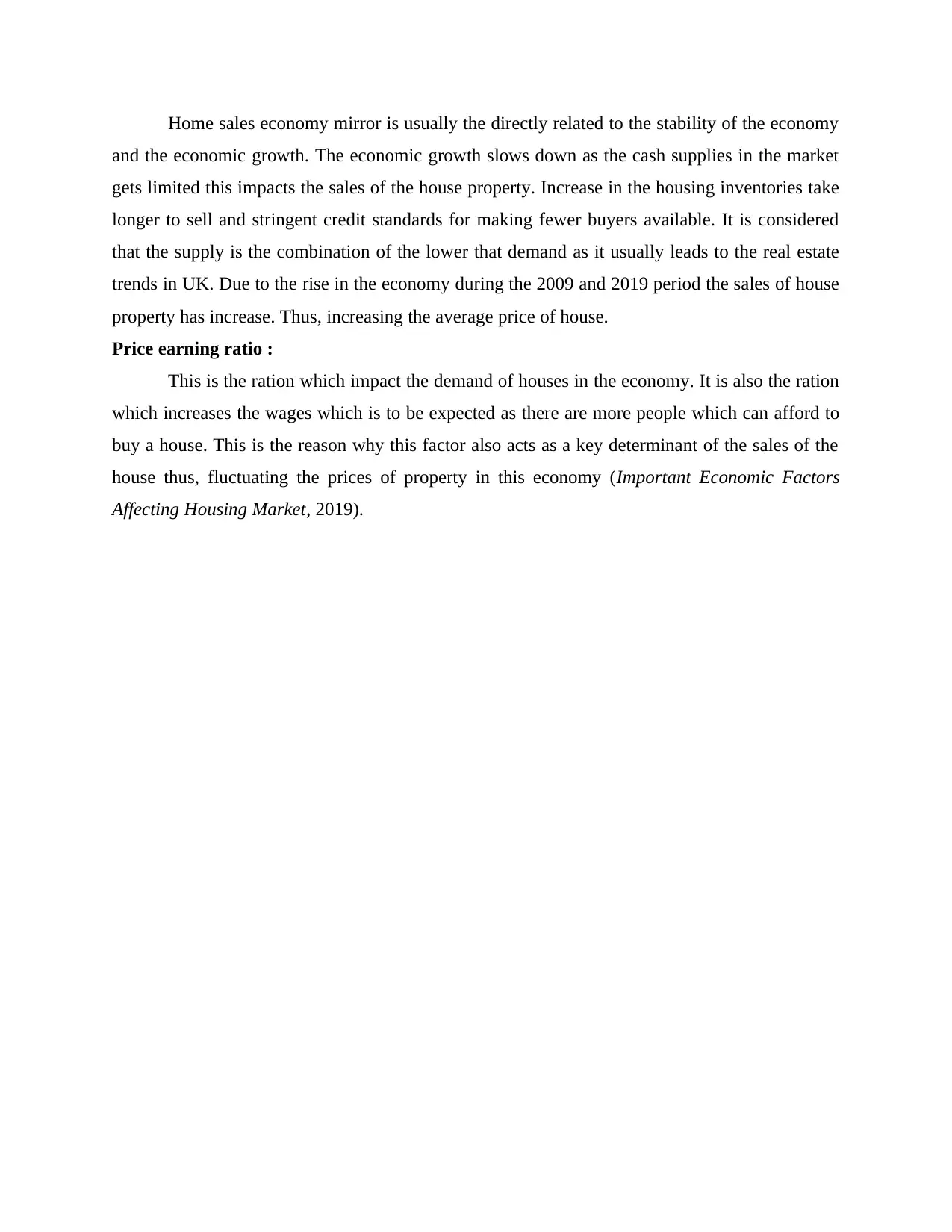
Home sales economy mirror is usually the directly related to the stability of the economy
and the economic growth. The economic growth slows down as the cash supplies in the market
gets limited this impacts the sales of the house property. Increase in the housing inventories take
longer to sell and stringent credit standards for making fewer buyers available. It is considered
that the supply is the combination of the lower that demand as it usually leads to the real estate
trends in UK. Due to the rise in the economy during the 2009 and 2019 period the sales of house
property has increase. Thus, increasing the average price of house.
Price earning ratio :
This is the ration which impact the demand of houses in the economy. It is also the ration
which increases the wages which is to be expected as there are more people which can afford to
buy a house. This is the reason why this factor also acts as a key determinant of the sales of the
house thus, fluctuating the prices of property in this economy (Important Economic Factors
Affecting Housing Market, 2019).
and the economic growth. The economic growth slows down as the cash supplies in the market
gets limited this impacts the sales of the house property. Increase in the housing inventories take
longer to sell and stringent credit standards for making fewer buyers available. It is considered
that the supply is the combination of the lower that demand as it usually leads to the real estate
trends in UK. Due to the rise in the economy during the 2009 and 2019 period the sales of house
property has increase. Thus, increasing the average price of house.
Price earning ratio :
This is the ration which impact the demand of houses in the economy. It is also the ration
which increases the wages which is to be expected as there are more people which can afford to
buy a house. This is the reason why this factor also acts as a key determinant of the sales of the
house thus, fluctuating the prices of property in this economy (Important Economic Factors
Affecting Housing Market, 2019).
⊘ This is a preview!⊘
Do you want full access?
Subscribe today to unlock all pages.

Trusted by 1+ million students worldwide
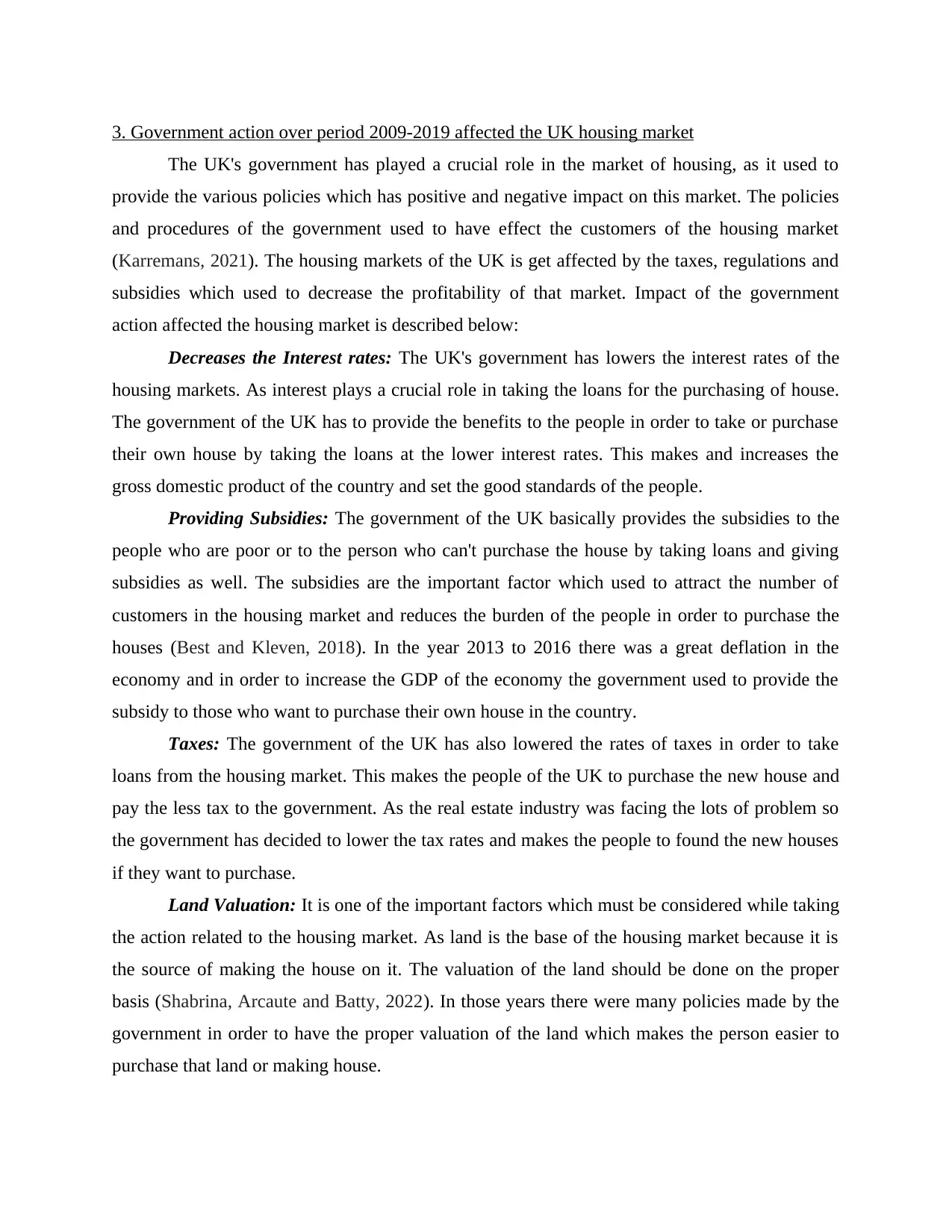
3. Government action over period 2009-2019 affected the UK housing market
The UK's government has played a crucial role in the market of housing, as it used to
provide the various policies which has positive and negative impact on this market. The policies
and procedures of the government used to have effect the customers of the housing market
(Karremans, 2021). The housing markets of the UK is get affected by the taxes, regulations and
subsidies which used to decrease the profitability of that market. Impact of the government
action affected the housing market is described below:
Decreases the Interest rates: The UK's government has lowers the interest rates of the
housing markets. As interest plays a crucial role in taking the loans for the purchasing of house.
The government of the UK has to provide the benefits to the people in order to take or purchase
their own house by taking the loans at the lower interest rates. This makes and increases the
gross domestic product of the country and set the good standards of the people.
Providing Subsidies: The government of the UK basically provides the subsidies to the
people who are poor or to the person who can't purchase the house by taking loans and giving
subsidies as well. The subsidies are the important factor which used to attract the number of
customers in the housing market and reduces the burden of the people in order to purchase the
houses (Best and Kleven, 2018). In the year 2013 to 2016 there was a great deflation in the
economy and in order to increase the GDP of the economy the government used to provide the
subsidy to those who want to purchase their own house in the country.
Taxes: The government of the UK has also lowered the rates of taxes in order to take
loans from the housing market. This makes the people of the UK to purchase the new house and
pay the less tax to the government. As the real estate industry was facing the lots of problem so
the government has decided to lower the tax rates and makes the people to found the new houses
if they want to purchase.
Land Valuation: It is one of the important factors which must be considered while taking
the action related to the housing market. As land is the base of the housing market because it is
the source of making the house on it. The valuation of the land should be done on the proper
basis (Shabrina, Arcaute and Batty, 2022). In those years there were many policies made by the
government in order to have the proper valuation of the land which makes the person easier to
purchase that land or making house.
The UK's government has played a crucial role in the market of housing, as it used to
provide the various policies which has positive and negative impact on this market. The policies
and procedures of the government used to have effect the customers of the housing market
(Karremans, 2021). The housing markets of the UK is get affected by the taxes, regulations and
subsidies which used to decrease the profitability of that market. Impact of the government
action affected the housing market is described below:
Decreases the Interest rates: The UK's government has lowers the interest rates of the
housing markets. As interest plays a crucial role in taking the loans for the purchasing of house.
The government of the UK has to provide the benefits to the people in order to take or purchase
their own house by taking the loans at the lower interest rates. This makes and increases the
gross domestic product of the country and set the good standards of the people.
Providing Subsidies: The government of the UK basically provides the subsidies to the
people who are poor or to the person who can't purchase the house by taking loans and giving
subsidies as well. The subsidies are the important factor which used to attract the number of
customers in the housing market and reduces the burden of the people in order to purchase the
houses (Best and Kleven, 2018). In the year 2013 to 2016 there was a great deflation in the
economy and in order to increase the GDP of the economy the government used to provide the
subsidy to those who want to purchase their own house in the country.
Taxes: The government of the UK has also lowered the rates of taxes in order to take
loans from the housing market. This makes the people of the UK to purchase the new house and
pay the less tax to the government. As the real estate industry was facing the lots of problem so
the government has decided to lower the tax rates and makes the people to found the new houses
if they want to purchase.
Land Valuation: It is one of the important factors which must be considered while taking
the action related to the housing market. As land is the base of the housing market because it is
the source of making the house on it. The valuation of the land should be done on the proper
basis (Shabrina, Arcaute and Batty, 2022). In those years there were many policies made by the
government in order to have the proper valuation of the land which makes the person easier to
purchase that land or making house.
Paraphrase This Document
Need a fresh take? Get an instant paraphrase of this document with our AI Paraphraser

These above stated are the steps and actions that the government has taken in order to
maintain the flow of the cash in the housing market. This used to have positive impact on the
people and affected the housing markets of the UK.
4. Impact of COVID- 19 on UK housing market
The COVID- 19 has a great impact on the economy and has negatively affected the
whole globe. By this it has an adverse impact on the housing market of the UK and it reduces the
growth of the real estate industry (Blakeley, 2021). The COVID- 19 has affected the economy by
causing the disruptions and affected the real estate market of the UK. There are some predictions
which has impacted the growth of the housing market due to COVID-19 which are as follows:
Decreases the flows of the economy: With the happening and spreading of the COVID-
19 it has affected the inflows and outflows of the UK's economy. The pandemic has close down
the whole markets of the country which used to decrease in the cash flows of the economy. This
has affected the budget of the people who wants and who were willing to purchase their own
house. By this it affected the profitability of the housing markets as the savings of the people
were decreased due to lock- downs.
Decreases the availability of finance: The COVID- 19 has affected the economy by
decreasing the availability of the finance as people were not earning that time. Due to happening
of the lock- downs it has affected the financial resources of the people in the market. This has
affected the financial stability of the people in the market as the market were closed and there
were no earnings by the people. This makes the housing markets of the UK to faces lots of
difficulties in order to increase the market share of the real estate industry.
Changing in the taste and preferences: The pandemic has direct impact on the savings
of the people across the globe and also of the people of the United Kingdom. By decreasing the
saving of the individuals it has changes the taste and preferences of the people in order to buy
house. The consumers start losing interest as in order to purchase the house. By this it has an
adverse impact on the housing markets of the UK (Allen-Coghlan and McQuinn, 2020.). As
most of the people were suffering from the pandemic, so they have spent their money in order to
recover from that disease. This has decreases the savings which results in change in the trends of
individual and has great effect on the housing markets.
Increases the land costs and labour costs: With the happening of the pandemic it has
cause the negative impact on the cost of the land and cost of the labours. This used to have direct
maintain the flow of the cash in the housing market. This used to have positive impact on the
people and affected the housing markets of the UK.
4. Impact of COVID- 19 on UK housing market
The COVID- 19 has a great impact on the economy and has negatively affected the
whole globe. By this it has an adverse impact on the housing market of the UK and it reduces the
growth of the real estate industry (Blakeley, 2021). The COVID- 19 has affected the economy by
causing the disruptions and affected the real estate market of the UK. There are some predictions
which has impacted the growth of the housing market due to COVID-19 which are as follows:
Decreases the flows of the economy: With the happening and spreading of the COVID-
19 it has affected the inflows and outflows of the UK's economy. The pandemic has close down
the whole markets of the country which used to decrease in the cash flows of the economy. This
has affected the budget of the people who wants and who were willing to purchase their own
house. By this it affected the profitability of the housing markets as the savings of the people
were decreased due to lock- downs.
Decreases the availability of finance: The COVID- 19 has affected the economy by
decreasing the availability of the finance as people were not earning that time. Due to happening
of the lock- downs it has affected the financial resources of the people in the market. This has
affected the financial stability of the people in the market as the market were closed and there
were no earnings by the people. This makes the housing markets of the UK to faces lots of
difficulties in order to increase the market share of the real estate industry.
Changing in the taste and preferences: The pandemic has direct impact on the savings
of the people across the globe and also of the people of the United Kingdom. By decreasing the
saving of the individuals it has changes the taste and preferences of the people in order to buy
house. The consumers start losing interest as in order to purchase the house. By this it has an
adverse impact on the housing markets of the UK (Allen-Coghlan and McQuinn, 2020.). As
most of the people were suffering from the pandemic, so they have spent their money in order to
recover from that disease. This has decreases the savings which results in change in the trends of
individual and has great effect on the housing markets.
Increases the land costs and labour costs: With the happening of the pandemic it has
cause the negative impact on the cost of the land and cost of the labours. This used to have direct

and adverse impact on the housing market of the UK. This makes the customers to starts loosing
their interest in order to pay more for the land and more labour cost for constructing the house
(Yang and Zhou, 2021). By this it has cause the negative impact on the sales of the lands and
housing markets of the United Kingdom. This used to increase in the construction projects and
causes delays in order to complete the constructing projects because of the happening of the
pandemic.
their interest in order to pay more for the land and more labour cost for constructing the house
(Yang and Zhou, 2021). By this it has cause the negative impact on the sales of the lands and
housing markets of the United Kingdom. This used to increase in the construction projects and
causes delays in order to complete the constructing projects because of the happening of the
pandemic.
⊘ This is a preview!⊘
Do you want full access?
Subscribe today to unlock all pages.

Trusted by 1+ million students worldwide
1 out of 15
Related Documents
Your All-in-One AI-Powered Toolkit for Academic Success.
+13062052269
info@desklib.com
Available 24*7 on WhatsApp / Email
![[object Object]](/_next/static/media/star-bottom.7253800d.svg)
Unlock your academic potential
Copyright © 2020–2026 A2Z Services. All Rights Reserved. Developed and managed by ZUCOL.





